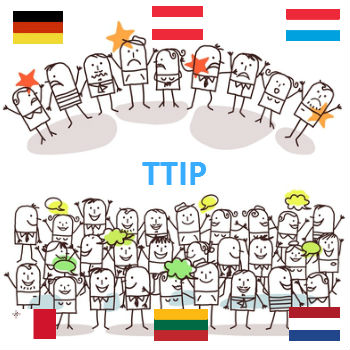 Cecilia Malmström, European Commissioner for Trade, made the point clearly: “If the European Parliament (EP) or the Bundestag vote against the Transatlantic Trade and Investment Partnership (TTIP) or the Comprehensive Economic and Trade Agreement (CETA), don’t blame it on me. It’s the national governments that need to convince their people on the benefits>.” TTIP requires votes in favor by the EP and each of the 28 national parliaments. So once negotiations are complete, TTIP will face a mere 29 democratic hurdles. Across the EU, media (primarily social media) feeds us a regular anti-TTIP diet. Yet, the trade and investment benefits are so clearly self-evident to many of the Europeans who are responsible for such agreements, that they think that they are no longer obliged to repeatedly explain and justify TTIP. An insight into why is the background of over 1,400 such successful agreements negotiated by the EU over the past 50 years supporting European companies as they trade and invest internationally. And the result is, in case you were unaware, that the EU 28 is now the world’s biggest trader and investor and recipient of foreign investments.
Cecilia Malmström, European Commissioner for Trade, made the point clearly: “If the European Parliament (EP) or the Bundestag vote against the Transatlantic Trade and Investment Partnership (TTIP) or the Comprehensive Economic and Trade Agreement (CETA), don’t blame it on me. It’s the national governments that need to convince their people on the benefits>.” TTIP requires votes in favor by the EP and each of the 28 national parliaments. So once negotiations are complete, TTIP will face a mere 29 democratic hurdles. Across the EU, media (primarily social media) feeds us a regular anti-TTIP diet. Yet, the trade and investment benefits are so clearly self-evident to many of the Europeans who are responsible for such agreements, that they think that they are no longer obliged to repeatedly explain and justify TTIP. An insight into why is the background of over 1,400 such successful agreements negotiated by the EU over the past 50 years supporting European companies as they trade and invest internationally. And the result is, in case you were unaware, that the EU 28 is now the world’s biggest trader and investor and recipient of foreign investments.
The EP based in both Strasbourg and Brussels, yet another European quirk, is the pre-eminent forum for political debate and decision-making at the EU level. The EP mandate is to represent people’s interests with regard to EU law-making and to make sure other EU institutions are working democratically (think EU Commission…). The EP has 751 Members elected from the current 28 Member States by the >500 million citizens, and they group themselves along political as well as national lines. In order to get the preparatory work for Parliament's plenary sittings, the Members are divided up among specialized committees. The role of the committees is to draw up, amend and adopt legislative proposals which are usually initiated by the EU Commission. There is, of course, the International Trade Committee (ITC) chaired by German MEP Bernd Lange (Socialists and Democrats Group), whose members at the beginning of June managed to add >900 amendments to the TTIP proposal, showing four main areas of concern: i) data protection ii) services that could be opened up to American providers iii) environmental sustainability and iv) investor protection mechanisms, which was then abandoned during the plenary session as un-manageable. Whoops. Back to the drawing board the ITC re-presented the proposal at the end of June with only 116 amendments which was then duly adopted in two separate votes. Lange summed up the situation stating that they are working “towards reaching a stable majority for the TTIP-resolution. The EP can only come forward with a strong message for the TTIP negotiators if our resolution is supported by a broad majority”.
 National governments, of which we have 28 in the EU, are subject to local public opinion, political vagaries and imperatives. Issues dominating some national agendas in Europe at this time include the Euro, immigration, unemployment and economic stagnation. So it is not surprising that TTIP is somewhat low on the agenda. EU national governments are just not on the pro-TTIP case at this time. Meanwhile, grass roots “Self-organised European Citizens’ Initiative against TTIP and CETA”, about which I reported last month, are working hard on the anti-TTIP message. This is evidenced by the now >2.3 million registered participants at the end of June 2015! A recent (01.2015) EU wide TTIP opinion poll reveals declining support (58%) for and growing antipathy (25%) against TTIP, with a substantial don’t know (17%). The anti-TTIP camp is led by Austria (53%), Luxembourg (43%) and Germany (41%), with France (33%) and Greece (32%), surprising companions in this space. In favor of TTIP we have Lithuania (79%), Malta (75%), the Netherlands (74%) and somewhat behind, the United Kingdom (65%) and Spain (63%). An example of how a single country could block TTIP, when a Greek Minister stated: “I can assure you that a Parliament where Syriza holds the majority will never ratify the deal. And this will be a big gift not only to the Greek people but to all the European people”.
National governments, of which we have 28 in the EU, are subject to local public opinion, political vagaries and imperatives. Issues dominating some national agendas in Europe at this time include the Euro, immigration, unemployment and economic stagnation. So it is not surprising that TTIP is somewhat low on the agenda. EU national governments are just not on the pro-TTIP case at this time. Meanwhile, grass roots “Self-organised European Citizens’ Initiative against TTIP and CETA”, about which I reported last month, are working hard on the anti-TTIP message. This is evidenced by the now >2.3 million registered participants at the end of June 2015! A recent (01.2015) EU wide TTIP opinion poll reveals declining support (58%) for and growing antipathy (25%) against TTIP, with a substantial don’t know (17%). The anti-TTIP camp is led by Austria (53%), Luxembourg (43%) and Germany (41%), with France (33%) and Greece (32%), surprising companions in this space. In favor of TTIP we have Lithuania (79%), Malta (75%), the Netherlands (74%) and somewhat behind, the United Kingdom (65%) and Spain (63%). An example of how a single country could block TTIP, when a Greek Minister stated: “I can assure you that a Parliament where Syriza holds the majority will never ratify the deal. And this will be a big gift not only to the Greek people but to all the European people”.
The takeaway from this is that the passage of time is not favoring TTIP in the eyes of the EU public. The stream of anti-TTIP social media is proving effective and national governments are not even framing the debate around TTIP benefits. Even worse, in the big influential nations of Germany and France, government ministries have come out as anti-TTIP on issues such as investor relations and agriculture. I don’t blame you Cecelia; you can take the EP and national governments horse to the water, but…
The question is: “What is your opinion on each of the following statements? Please tell me for each statement, whether you are for it or against it. (ONE ANSWER PER LINE). A free trade and investment agreement between the EU and the USA” conducted by Eurobarometer website results below:
| COUNTRY | FOR | AGAINST | DON'T KNOW |
| EU average | 58 | 25 | 17 |
| Austria | 39 | 53 | 8 |
| Belgium | 66 | 26 | 8 |
| Bulgaria | 64 | 14 | 22 |
| Croatia | 67 | 23 | 10 |
| Cyprus | 59 | 25 | 16 |
| Czech Republic | 62 | 25 | 13 |
| Denmark | 71 | 17 | 12 |
| Estonia | 72 | 11 | 17 |
| Finland | 62 | 21 | 17 |
| France | 50 | 33 | 18 |
| Germany | 39 | 41 | 20 |
| Greece | 61 | 32 | 7 |
| Hungary | 62 | 28 | 10 |
| Ireland | 71 | 15 | 14 |
| Italy | 58 | 22 | 20 |
| Latvia | 66 | 18 | 16 |
| Lithuania | 79 | 9 | 12 |
| Luxembourg | 40 | 43 | 17 |
| Malta | 75 | 11 | 14 |
| Netherlands | 74 | 18 | 8 |
| Poland | 73 | 11 | 16 |
| Portugal | 60 | 23 | 17 |
| Romania | 75 | 11 | 14 |
| Slovakia | 62 | 26 | 12 |
| Slovenia | 57 | 31 | 12 |
| Spain | 63 | 19 | 18 |
| Sweden | 59 | 26 | 15 |
| United Kingdom | 65 | 19 | 16 |

